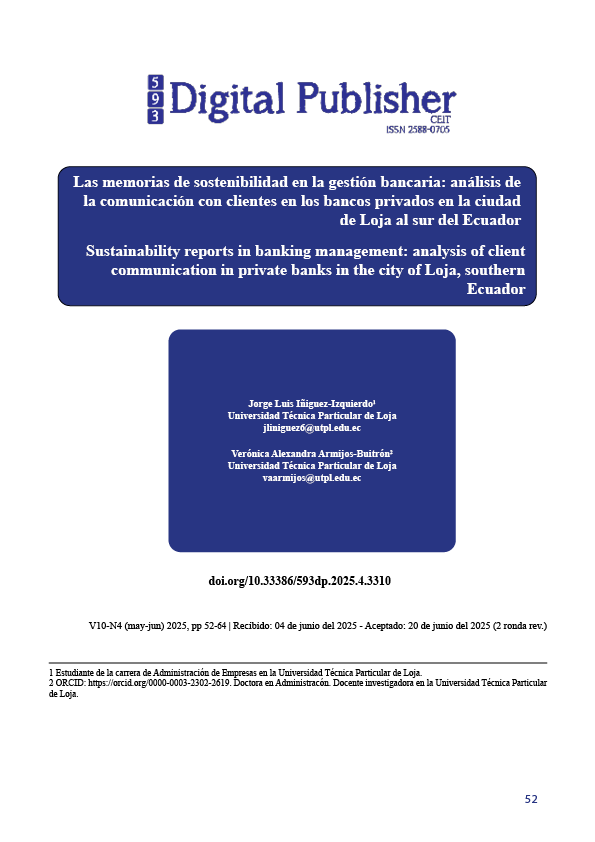Sustainability reports in banking management: analysis of client communication in private banks in the city of Loja, southern Ecuador
Main Article Content
Abstract
Sustainability reports are a crucial tool for modern banking management, as they are instruments that help communicate the commitment to sustainable development with their various stakeholders. The objective of this research was to analyze the impact of the communication of these reports on the relationship between the main private banks in Loja and their clients, using a quantitative approach with a descriptive scope. A total of 384 structured surveys were administered to clients of Banco de Loja (184), Banco Pichincha (120), and Banco Guayaquil (80), revealing a significant contradiction: 72% of clients report being aware of these reports, but only 44% consider them to be clear and understandable. This study identified how the information contained in these reports can influence banking preference (42.45%), highlighting their strategic value for loyalty. The findings revealed a marked preference for Banco de Loja (47.92%), suggesting a notable inclination toward local banking entities. Based on these results, each financial institution can develop strategies to improve the dissemination of the results of socially responsible actions through sustainability reports, aligned with three dimensions: improving the client-bank partnership, optimizing sustainability reports, and strengthening Corporate Social Responsibility practices.
Downloads
Article Details

This work is licensed under a Creative Commons Attribution-NonCommercial-ShareAlike 4.0 International License.
1. Derechos de autor
Las obras que se publican en 593 Digital Publisher CEIT están sujetas a los siguientes términos:
1.1. 593 Digital Publisher CEIT, conserva los derechos patrimoniales (copyright) de las obras publicadas, favorece y permite la reutilización de las mismas bajo la licencia Licencia Creative Commons 4.0 de Reconocimiento-NoComercial-CompartirIgual 4.0, por lo cual se pueden copiar, usar, difundir, transmitir y exponer públicamente, siempre que:
1.1.a. Se cite la autoría y fuente original de su publicación (revista, editorial, URL).
1.1.b. No se usen para fines comerciales u onerosos.
1.1.c. Se mencione la existencia y especificaciones de esta licencia de uso.
References
Al Hawaj, A. Y., & Buallay, A. M. (2022). A worldwide sectorial analysis of sustainability reporting and its impact on firm performance. Journal of Sustainable Finance & Investment, 12(1), 62-86.
Alvarez I. y Heras I. (2023). Investigación académica sobre memorias de sostenibilidad. ASEPUC,26(1).https://digitum.um.es/digitum/bitstream/10201/127466/1/05_Investigaci%c3%b3n%20acad%c3%a9mica%20sobre%20memorias%20de%20sostenibilidad.pdf
Alvear, L., Palacio, A. y Pérez, Y. (2023). Memorias de sostenibilidad y su aseguramiento. Repositorio Institucional Universidad Cooperativa de Colombia. https://repository.ucc.edu.co/entities/publication/7d4fa6ae-1eee-4f5f-9a4f-3acaf982a11d
Benítez, L. (2024). El Informe Brundtland: el origen de los ODS | .https://www.holaluz.com/blog/informe-brundtland-origen-ods-agenda-2030/#:~:text=El%20informe%2C%20cuyo%20nombre%20original,las%20de%20las%20futuras%20generaciones.
Calderón, J. (2022). La importancia de los informes y la divulgación de la sostenibilidad corporativa para los inversores responsables y cómo mejorarla. https://es.linkedin.com/pulse/la-importancia-de-los-informes-y-divulgaci%C3%B3n-para-j-felipe
Cervantes, M. (2020). La comunicación desde el consejo de administración: estudio empírico sobre la legibilidad de los informes de sostenibilidad. Revista de Comunicación de la SEECI. https://doi.org/10.15198/seeci.2020.53.103-134
Cisneros-Caicedo, A., Guevara-García, A., Urdánigo-Cedeño, J., Garcés-Bravo, J. (2022). Técnicas e Instrumentos para la Recolección de Datos. Dominio de las Ciencias, 8(1). https://dominiodelasciencias.com/ojs/index.php/es/article/view/2546/5714
Corralejo. (2022). La comunicación. Mheducation. chrome-extension://efaidnbmnnnibpcajpcglclefindmkaj/https://www.mheducation.es/bcv/guide/capitulo/8448180445.pdf
Diaz, A. (2021). La importancia de la comunicación. ResearchGate. https://www.researchgate.net/publication/356904357_La_importancia_de_la_comunicacion#full-text#full-text
Fernández, L. (2019). Cumbre de la Tierra: qué es, acuerdos y objetivos. ecologiaverde.com. https://www.ecologiaverde.com/cumbre-de-la-tierra-que-es-acuerdos-y-objetivos-2291.html
Freeman, E. (2001). A Stakeholder Approach to Strategic Management. Social Science Research Network. https://doi.org/10.2139/ssrn.263511
Freire Espinoza, A. G. (2017) La percepción de la Responsabilidad Social Corporativa en la Banca Privada de la ciudad de Loja, año 2017 [Tesis de N/D, Universidad Técnica Particular de Loja]. Repositorio Institucional. https://dspace.utpl.edu.ec/handle/123456789/20415
Gómez, S. (2019). Metodología de la investigación. https://dspace.itsjapon.edu.ec/jspui/bitstream/123456789/735/1/Metodologia_de_la_investigacion.pdf
Gómez,V., Sánchez, J., Domínguez, J., Quezada, Z., Valencia, J. (2021). Comunicación organizacional en las empresas del sur de Veracruz en tiempos de COVID-19. UVSERVA, 12. https://uvserva.uv.mx/index.php/Uvserva/article/view/2801/4738
Hamad,S., Umar M.,y Woon, L. (2020). The Impact of Corporate Governance and Sustainability Reporting on Integrated Reporting: A Conceptual Framework. Sage Journals Home. https://doi.org/10.1177/2158244020927431
Jarreta, (2021). Responsabilidad Social Corporativa en las PYMES: Caso práctico de Memoria de Sostenibilidad. https://zaguan.unizar.es/record/108944/files/TAZ-TFG-2021-1680.pdf
Jordonez. (2021). GRI lanza una importante actualización de los estándares de informes de sostenibilidad - Latam Green. Latam Green. https://latam-green.com/gri-lanza-una-importante-actualizacion-de-los-estandares-de-informes-de-sostenibilidad/
Locatelli, P. (2021). La sostenibilidad como directriz vinculante para el desarrollo de las ciudades. https://rua.ua.es/dspace/handle/10045/109738
Mitchell, R. Agle, B. y Wood, D. (1997). Toward a Theory of Stakeholder Identification and Salience: Defining the Principle of who and What Really Counts. The Academy Of Management Review, 22(4), 853-886. https://doi.org/10.5465/amr.1997.9711022105
Millan, V. y Martorell, V. (2020). Memoria de sostenilidad. https://zaguan.unizar.es/record/101932/files/TAZ-TFG-2020-1533.pdf
Momchilov, G. (2022). Sustainability reporting by companies: reasons and financial benefits. VUZF University, 7(1). https://pdfs.semanticscholar.org/1aff/6832f65065797a69ef0df50cfe441866ff17.pdf
Petrescu, A., Bilcan, F., Oncioiu, I., Turkes, M. y Capusneanu, S. (2020). Assessing the Benefits of the Sustainability Reporting Practices in the Top Romanian Companies. Sustainability, 12(8). https://doi.org/10.3390/su12083470
Ramoglou, S., Zyglidopoulos, S. & Papadopoulou, F. (2023). Is There Opportunity Without Stakeholders? A Stakeholder Theory Critique and Development of Opportunity-Actualization. Entrepreneurship Theory And Practice, 47(1), 113-141. https://doi.org/10.1177/10422587211043354
Ramos-Galarza, C. (2020). Los alcances de una investigación. Dialnet, 9(3). https://dialnet.unirioja.es/servlet/articulo?codigo=7746475
Robayo, L. (2024). Informes de sustentabilidad: herramientas de comunicación y reputación.https://www.mundoexpopack.com/empaque/sustentabilidad/article/22890674/por-qu-son-importantes-los-informes-de-sustentabilidad
Safari, M y Areeb, A. (2020). A qualitative analysis of GRI principles for defining sustainability report quality: an Australian case from the preparers’ perspective. Accounting Forum, 44. https://doi.org/10.1080/01559982.2020.1736759
Salazar, N., Martinez, C, Sánchez, V, y Briones, C. (2019). Comunicación organizacional interna y su relación con la satisfacción de los empleados de una empresa concesionaria de automóviles de Piedras Negras Coahuila. GEON, 7(1).
Sánchez, F. (2019). Fundamentos Epistémicos de la Investigación Cualitativa y Cuantitativa: Consensos y Disensos. REVISTA DIGITAL DE INVESTIGACIÓN EN DOCENCIA UNIVERSITARIA, 13(1). chrome-extension://efaidnbmnnnibpcajpcglclefindmkaj/http://www.scielo.org.pe/pdf/ridu/v13n1/a08v13n1.pdf
Thompson, C. (2023). Global Reporting Initiative (GRI): Purpose, Standards, and Importance. Investopedia. https://www.investopedia.com/global-reporting-initiative-7483127
Trelles Calle, L. B. (2018) Análisis al modelo de gestión de responsabilidad social, aplicado por los bancos privados del Ecuador, año 2015. Propuesta alternativa [Tesis de Postgrado, Universidad Técnica Particular de Loja]. Repositorio Institucional. https://dspace.utpl.edu.ec/handle/20.500.11962/23158
United Nations. (2023). Transforming our world: the 2030 Agenda for Sustainable Development | Department of Economic and Social Affairs. https://sdgs.un.org/2030agenda



